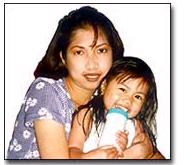
On March 5, 2013 the oral arguments for the murder case of Claire Joyce Tempongko was held at the California Supreme Court to hear the Court of Appeal's decision to overturn the ruling of second-degree murder.
This case is the foundation of FWN's anti-domestic violence campaign. We worked very hard through the years to help get her murderer arrested after he escaped to Mexico, to get him extradited to San Francisco, and to finally get him convicted in 2008. In 2011, the First District Court of Appeal overturned his conviction and now the case is up for oral arguments at the Supreme Court. On March 5th, many showed support for our on-going campaign, by taking a couple hours of their time to ensure that Claire Joyce's murderer does not go free. This case will impact future domestic violence related homicides.
Below you will find a message from Beverly Upton, and more information about the Tempongko murder case, including a copy of the amicus letter, a list of the justices and the questions asked at the California Supreme Court oral arguments.
--Marily Mondejar, President
----------------------------------------------------
Message from Beverly Upton, Executive Director, San Francisco Domestic Violence Consortium:
Please join me at the CA Supreme Court on Tuesday, March 5th at 1:30 to hear the oral arguments regarding the lower court's decision to overturn the guilty verdict in the death of Claire Joyce Tempongko. The decision could have a lasting effect on DV cases throughout the state and beyond. For many of us, it is less instructive, it is about standing with the Tempongko family once again. It is about a young mom who was killed in front of her small children in our city. It is about requiring that additional jury instructions be given in domestic violence homicides regarding 'crimes of passion'. It is about the value of Claire Joyce's life and the thousands of others like her, in the eyes of the law.
We are so very grateful that the CA Supreme Court has agreed to hear this case. The Attorney General's Office will be arguing in favor of overturning the lower court's decision and upholding the jury's verdict.
We thank them. We stand with the family of Claire Joyce Tempongko. Join us.
-----------------------------------------------------
Comments from Attorney Minouche Kandel, Bay Area Legal Aid:
In 2011, the California Court of Appeal decided a case that is very problematic for anti-domestic violence and pro-choice advocates. The case is People v. Beltran, California Court of Appeals. First Appellate District, Case number A124392. The case involves a very publicized domestic violence homicide that occurred in San Francisco in 2000, where the defendant, Tare Nicholas Beltran, murdered his ex-girlfriend, Claire Joyce Tempongko, in front of her two young children. Beltran had a documented history of domestic violence against Claire Joyce, and was on probation for domestic violence against her at the time of the murder.
The defendant fled to Mexico and it took six years to track him down and extradite him back to San Francisco. He was convicted at trial of second-degree murder. His attorney appealed. Beltran does not deny killing Claire Joyce, but claims it was manslaughter because of "provocation" and not murder. The alleged provocation was that Claire Joyce supposedly told Beltran that she had aborted his baby, and that he had not known she was pregnant or had an abortion, and this sent him over the edge.
His attorney argued that an improper jury instruction was given to the jury. The jury was given the instruction that to mitigate murder to manslaughter, the test is "whether a person of average disposition would have been provoked and how such a person would react in the same situation knowing the same facts." The defendant argued that this implied that the jury must conclude that the provocation must have been sufficient to induce a reasonable person to kill, and that this was not necessary, but rather that the test should be whether the provocation was sufficient to "induce a reasonable person to act from emotion rather than reason." The Court of Appeal overturned the trial court's decision based on the jury instruction.
This case raises some very important issues around whether a woman's comments on abortion should even be considered as provocation, as well as the history of domestic violence murders being downplayed as "heat of passion" manslaughter even when there is extensive history of previous acts of violence (as there was in this case). Domestic violence offenders frequently try to blame their victims for provoking them, to reduce their culpability from murder to manslaughter. The Court of Appeal has significantly lowered the standard for finding manslaughter, by requiring only that a reasonable person would be moved to the same "rash" act, rather than requiring that a reasonable person must have been moved to violence in response to the provocation.
-------------------------------------------------------
People v. Beltran (Tare Nicholas), S192644
For Respondent: Jeffrey M. Laurence, Office of the Attorney General, San Francisco.
For Appellant: Linda M. Leavitt, San Francisco.
Petition for review after the Court of Appeal reversed a judgment of conviction of a criminal offense. This case presents the following issues:
(1) Was the jury misinstructed with former CALCRM No. 570 on provocation and heat of passion as a basis for a conviction of voluntary manslaughter?
(2) Did the prosecutor misstate the applicable law on the subject in argument?
(3) Did the trial court accurately respond to a jury question on the subject?
(4) If there was error, was defendant prejudiced?
-------------------------------------------------------
The Justices:
Hon. Tani G. Cantil-Sakauye, Chief Justice
Hon. Joyce L. Kennard, Associate Justice
Hon. Marvin R. Baxter, Associate Justice
Hon. Kathryn M. Werdegar, Associate Justice
Hon. Ming W. Chin, Associate Justice
Hon. Carol A. Corrigan, Associate Justice
Hon. Goodwin Liu, Associate Justice

Please wait...